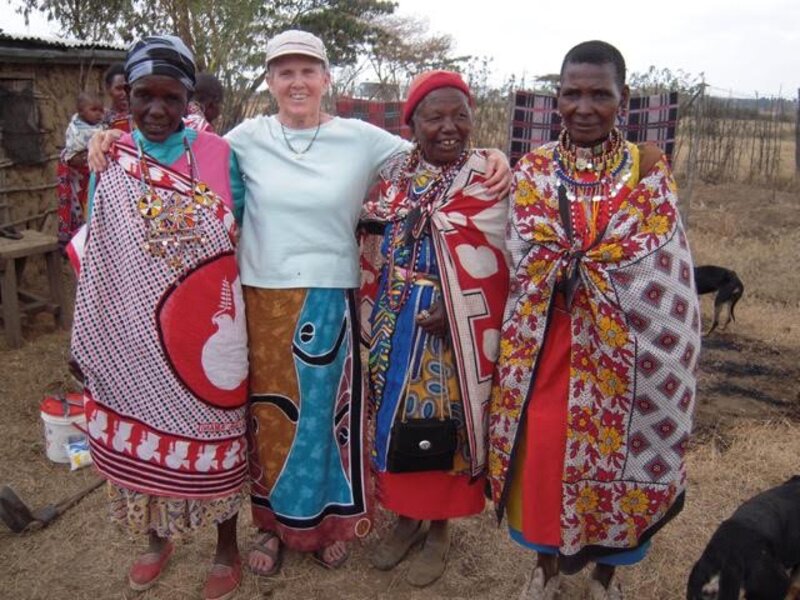Volunteering for Lifewater International: 'I was hooked'
Loading...
Sally Scholl has made a life out of teaching others.
She spent 26 years as an elementary school teacher in the San Ramon Valley (Calif.) Unified School District, and then spent two years in Kenya with the Peace Corps training those in poor communities how to care for themselves and the environment.
Today, she volunteers with Lifewater International, and has worked to provide training in safe water, sanitation, and hygiene to teachers, community, and religious leaders in Ethiopia, Uganda, Zambia, Mozambique, Kenya, China, and Cambodia.
“I was hooked,” says Ms. Scholl, sharing how she was drawn to the mission of Lifewater when she first attended one of the organization’s conferences. “They put me on a trip right away, and it was a survey trip to Ethiopia. Ever since then, I have been going on one or two trips a year, which has been fascinating and terribly rewarding.”
Based in San Luis Obispo, Calif., Lifewater International is a nonprofit, Christian organization. Since 1977, Lifewater has helped some 2.5 million people in more than 40 countries obtain reliable access to safe drinking water.
Today the organization is focusing its efforts in remote areas of Africa and Asia, helping an estimated 50,000 to 60,000 people each year – figures that are growing as outreach efforts expand and new offices are opened abroad.
The organization has used its several decades of experience to evaluate its methods and hone in on the best practices in water access, sanitation, and hygiene – known by the acronym WASH – says Lifewater CEO Justin Narducci, who joined Lifewater in 2013.
“I saw how effective WASH was at helping families take the first step out of poverty,” Mr. Narducci says. According to the organization, its approach places an emphasis not just on meeting an immediate need, but on working toward lasting solutions.
That’s where program staff members, and volunteers like Scholl, come into play.
“Usually we train teachers,” Scholl says of her volunteer duties, adding that Lifewater also provides educational programs to government officials and community development workers. Once they are trained, they take the lessons they learn back to their students and colleagues. The students then carry those lessons home to their families – spreading information about health, hygiene, and water.
“They are hungry for knowledge,” Scholl says. “I think it is amazing. It is very sustainable the way it is done.”
The Lifewater model is supported by data and experience as well: According to the organization, providing access to safe drinking water can reduce water-borne disease by 30 percent. Education and behavioral changes improve sanitation and hygiene practices.
“As we have seen with the Flint [Mich.] water crisis here in the United States, it is simply unacceptable for anyone to drink and use unsafe water, especially when you see the impact that contaminated water has on children,” Narducci says. “And yet, this happens all over the world each and every day. Where’s the outrage?”
The main objective for Lifewater over the next few years is to open a new field office in a rural region of East Africa and Southeast Asia every quarter – with special attention paid to small steps that impoverished families can take to immediately improve their health.
“Small wins that the community members make – like building a simple pit latrine for handling human waste – build confidence and give a deep sense of ownership in the process,” Narducci says. Then, when access to safe water is provided, it is something that will be sustainable in that community.
The Lifewater cause hits close to home for Narducci, whose adopted son suffered from a water-borne disease contracted in an orphanage prior to his first birthday.
“We actually thought we might lose him,” he says. “If we were living in the developing world, our little guy doesn’t live.”
Today, the Narduccis' son is 8, doing well in second grade, and making his mark on the basketball court.
“All of this really does leave one to wonder,” Narducci says, “how much our world is missing out from the losses created by these preventable water-borne diseases.”
Meanwhile, Scholl is about to embark on her next educational outreach mission for Lifewater, this one in Ethiopia. It will be her 21st .
• To learn more, visit www.lifewater.org.





